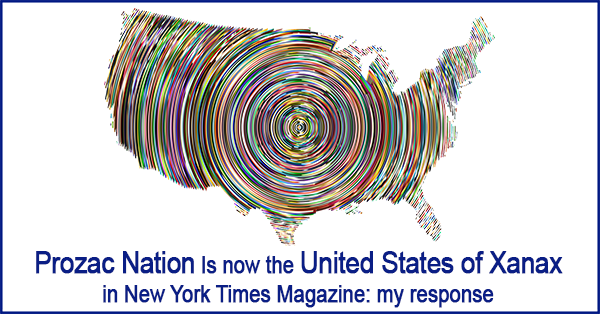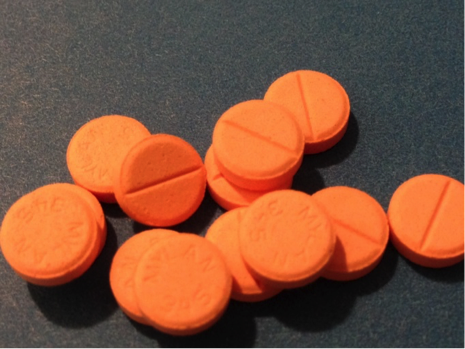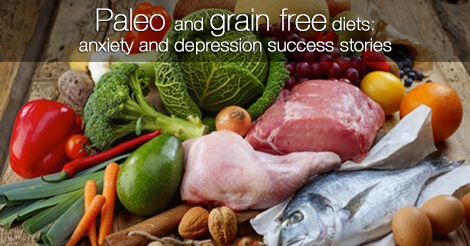
This is the title of a new article recently published in the New York Times Magazine: Prozac Nation Is Now the United States of Xanax. In other words, depression has been surpassed by anxiety and the antidepressant Prozac has been replaced by Xanax (and other benzodiazepines /anti-anxiety medications) by the US population!
It’s an excellent read for creating awareness about anxiety and benzodiazepines but also sad because there is so much we can do and no solutions are offered. Here are some startling stats shared in the article:
According to data from the National Institute of Mental Health, some 38 percent of girls ages 13 through 17, and 26 percent of boys, have an anxiety disorder. [Note: this was quoted in the article. I’m trying to track down the source because an article in Time Magazine last year says this: ‘About 30% of girls and 20% of boys–totaling 6.3 million teens–have had an anxiety disorder, according to data from the National Institute of Mental Health’ as of 2015.]
On college campuses, anxiety is running well ahead of depression as the most common mental health concern, according to a 2016 national study of more than 150,000 students by the Center for Collegiate Mental Health at Pennsylvania State University. [Both anxiety and depression have shown slight but persistent increases each year for the past six years]
Meanwhile, the number of web searches involving the term [anxiety] has nearly doubled over the last five years, according to Google Trends. (The trendline for “depression” was relatively flat.)
I’m the optimistic type, I’m proactive and I like to give hope as well as solutions – and I have quite a bit to say about this article so here goes.
#1 Too many people are prescribed benzodiazepines without knowing what they are getting into
The article does not address the issues with benzodiazepines: how too many people are prescribed benzodiazepines without knowing what they are getting into, with many suffering dreadfully and never offered nutritional solutions. When I shared the article on my facebook page, someone in my community shared this (and gave me permission to share it further in the hope someone else will be spared her suffering)
Been totally disabled by benzo for 3.5 years. I have been off meds for 17.5 months and the impact of these meds makes any anxiety I ever felt a cake walk. Please run from the poison. Find healthy foods, nutrition and take the break your body is begging you for. We need to listen to our bodies! If it is screaming with anxiety maybe you need to make some life changes. I wish I did instead of taking a med that has almost destroyed me.
I asked her what symptoms she was experiencing, and as well as suffering from severe motion sickness (so badly she can’t even leave her home) she also shared this:
I have locked shoulder muscles, neck, jaw; I have internal vibrations, I get bad headaches, jelly legs, distorted vision like floaters and squiggles and fireworks, my teeth all feel like they will fall out but they are not lose, it feels like adrenaline or cortisol rushes through the body. Sometimes arms go numb. I am pretty tortured every day. These meds are truly causing chemical warfare on some of us.
I believe this will be the next big epidemic and I hope I heal somehow to help others
She had been on a variety of benzodiazepines, SSRIs and other medications for over 17 years and you may think this is an isolated incidence. I assure you it is not – just read the list of the most common psychological and physical symptoms of benzodiazepine withdrawal.

Here is some useful information about the risks and dangers of benzodiazepines:
- World Benzodiazepine Awareness Day – say NO to Benzodiazepines for anxiety!
- Benzodiazepines do patients more harm than good
#2 Let’s help anxious individuals like you find solutions
Scott Stossel, journalist and author of My Age of Anxiety: Fear, Hope, Dread, and the Search for Peace of Mind was quoted as saying this in the article:
The silver lining for those with nervous disorders is that we can welcome our previously non-neurotic fellow citizens into the anxious fold.
My first response to the article is this: I say NO to Scott Stossel and instead I say let’s think bigger and instead let’s invite the anxious citizens into the calm and no-more-anxiety fold!
Scott’s book is well-written book, offers an excellent understanding of what it feels like to experience anxiety and panic attacks, and has many compelling stories. But as a number of his Amazon reviewer’s say the big question is this: what is the answer or solution? Unfortunately it’s not provided in his book (or the New York Times Magazine article).
The New York Times Magazine article provides another anxiety resource that has helped “bring anxiety into the open, and allowed its clinical sufferers to band together in a virtual group-therapy setting”: The Sarah Fader on twitter, creator of the hashtag #ThisIsWhatAnxietyFeelsLike and a mental-health advocacy organization called Stigma Fighters.
Again, these are wonderful resources for support, awareness and advocacy but they don’t offer solutions if you suffer from anxiety. With nutritional solutions we can change this to #ThisIsWhatCalmFeelsLike.
#3 Too few people know about nutritional solutions
Too few people know about nutritional solutions and that has to change. Clinically we know it works and there is now SO much research supporting this approach.

Here are a few of many blog posts on my site that share powerful anxiety nutrition solutions:
- Paleo and grain free diets: anxiety and depression success stories
- GABA the calming amino acid: common questions I get asked
- GABA for children: ADHD, focus issues, irritability, anxiety and tantrums
- Tryptophan for PMS: premenstrual dysphoria, mood swings, tension, and irritability
Here is one of the latest food and mental health studies – A modified Mediterranean dietary intervention for adults with major depression: Dietary protocol and feasibility data from the SMILES trial
This and other dietary and nutritional approaches for both depression and anxiety will be presented at the upcoming International Society of Nutritional Psychiatry Research conference in Bethesda, MD next month)
Here are two book resources too: my book The Antianxiety Food Solution and integrative psychiatrist Kelly Brogan’s book A Mind of Your Own.
I’d love your feedback
- Which nutritional solutions topics do you have questions about and in what areas do you still need help?
- What ideas do you have for getting this nutritional solution message out in a bigger way?
- What do you wish you’d known when you were first diagnosed with anxiety and prescribed medication (such as a benzodiazepine or SSRI)?
- How do we convince the naysayers that this does work and is worth implementing?
- How do we get the mainstream mental health community on board?
- What anxiety resources do you have to share